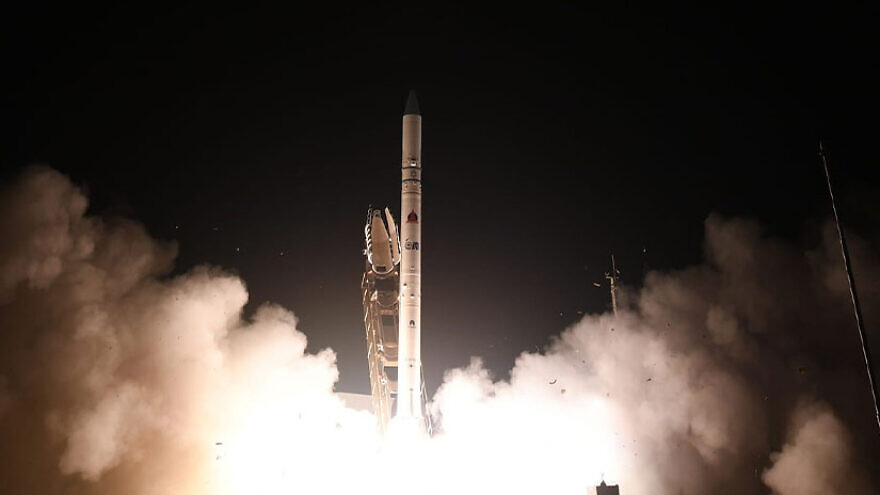The “Ofek 16” satellite, launched by the Ministry of Defense and Israel Aerospace Industries, will significantly upgrade Israel’s ability to monitor
the activities of the Iranian-Shi’ite axis throughout the Middle East.
The “Ofek 16” spy satellite launched from central Israel at 4 a.m. on Monday morning is due to significantly upgrade Israel’s ability to monitor the dangerous activities of its adversaries throughout the Middle East, foremost among them Iran.
The satellite was launched successfully by the Defense Ministry and Israel Aerospace Industries (IAI) following years of research and development, and a working schedule that in recent months had to be adapted to restrictions created by the coronavirus pand
IAI officials said they viewed the satellite’s launch as a top priority. This is due to the fact that “Ofek 16” is designed to provide the Israeli defense establishment with a higher than ever resolution camera in space.
Amnon Harari, head of the Ministry’s Space and Satellite Administration, noted on Monday that the latest spy satellite joins a series of similar ones in orbit, including the “Ofek 5,” launched in 2002, which remains operational to this day. The first of the “Ofek” (the Hebrew word for “horizon”) series was launched in 1988.
“The group of satellites are being used to monitor any threats to the State of Israel, which as you know are sometimes far away and immediate, so they require constant monitoring,” he said.
According to IAI’s Space Division chief, Shlomi Sudri, “Ofek 16” has an advanced electro-optical (camera) sensing system that will “enhance the strategic intelligence capability of the State of Israel.”
While no further details were provided about that system, it’s worth noting that on previous Israeli satellites, an advanced camera system called “Jupiter,” made by Elbit Systems, had been installed.
According to Elbit’s website, the camera enables investigations of “very high-value targets,” and it provides higher definition images of small and discrete vehicles, objects and structure. It also can be used for “more detailed operational planning” and “more enhanced battle damage assessment,” meaning looking at the damage caused to enemy targets.
It doesn’t seem to be a stretch of the imagination to conclude that such a satellite will help Israel track Iran’s nuclear program with new technology, as well as monitor Iran’s malign activity throughout the Middle East—particularly the trafficking of weapons to Iran’s proxies like Hezbollah—and activities in Syria.
‘At the forefront of technological capabilities’
The “Ofek 16” satellite represents remarkable cooperation among various defense companies. IAI is the prime contractor and responsible for the Shavit space launcher, while Rafael Advanced Defense Systems and Tomer, a government-owned company, built the launch engines. The Defense Ministry’s Space Administration led the development and production.
Defense Minister Benny Gantz paid tribute to the “people who have been investing in these systems and advancing breakthrough capabilities over the years. We will continue to strengthen and maintain Israel’s capabilities on every front, in every place.”
In 2016, Israel launched its “Ofek 11” satellite, which overcame early technical problems to become fully operational. Two years earlier, in 2014, Israel launched the “Ofek 10” satellite, which uses a radar system rather than a camera to monitor events of interest. Its SAR (Synthetic aperture radar) payload has advanced day and night photography capabilities, and works in all weather conditions.
Once the “Ofek 16” is deemed fully operational, the Defense Ministry will hand over the satellite’s controls to the Israel Defense Forces’ 9990 visual intelligence Unit.
Israel invests hundreds of millions of shekels per year in its space and satellite industries, which in turn fuels new technology.
The Jewish state belongs to a small club of 13 countries in the world that is able to build and launch its own satellites—one that includes the United States, Russia, China, Iran, France, the United Kingdom and Ukraine.
According to the Defense Ministry, “the investment of the State of Israel in space technology is considered essential and strategic for intelligence purposes. This is a multi-year investment, which requires a multitude of resources, consistency and professionalism. The goal is to ensure that the Israeli satellite program will remain at the forefront of technological capabilities and will continue to produce advanced satellites, which will maintain Israel’s intelligence and technological superiority.”
(JNS).
